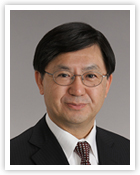Greeting
The 79th Annual Meeting of the Japanese Society of Hematology

Congress President
Department of Hematology
Saitama Medical Center, Saitama Medical University
The 79th Annual Meeting of the Japanese Society of Hematology will be held at the Tokyo International Forum over the three-day period from Friday, October 20 to Sunday, October 22, 2017.
The last time the Annual Meeting was held in Tokyo was for the 61st Annual Meeting of the Japanese Society of Hematology (JSH) in 1999, before it merged with the Japanese Society of Clinical Hematology. This will therefore be the first time in 18 years that the congress has been held in Tokyo. The intervening years have seen dramatic advances in hematology. Advances in basic research, mainly molecular biology, have enabled the identification of the molecular pathologies of many hematological diseases, and the introduction of new treatment methods based on these discoveries has greatly transformed the clinical management of hematological disorders. As if responding to this trend in hematology, Tokyo is also undergoing a dynamic transformation in the run-up to the Olympic Games, which will be held in the city in 2020. I believe that it is highly significant that we are holding a congress on hematology, which is such a vibrant field, in a city that is undergoing such major changes.
The theme of the congress will be “Innovation and Creation: Advances in Hematology for the Next Generation.” “Innovation and Creation” are important topics that are now being pursued for the development of hematology. How well we can train the next generation of young hematologists is also a central question for the development of this field in Japan. Internationalization also remains an important issue for the congress. We are planning the program for the 79th Annual Meeting on the basis of these concepts, including new special events. Professor H. Phillip Koeffler of UCLA and the National University of Singapore, my own mentor who has trained many Japanese hematologists, Professor Kenneth C. Anderson of the Dana-Farber Cancer Institute, who is the president of the American Society of Hematology (ASH), and by Professor Pieter Sonneveld of Erasmus University, who is the president of the European Hematology Association (EHA), have all been invited to give Special Lectures. Academic symposia will be held on ten themes. A Presidential Symposium with the title “Young Japanese Hematologists in the World” is also being planned, in which five young Japanese researchers who are active on the global stage as principal investigators (PIs) with their own laboratories will discuss the molecular pathology of leukemia and leukemic stem cells. As a new venture, we are also planning four Presidential Symposia on socio-hematology issues (SHI). We will take up the issues of (1) the board certification system, (2) the shape of clinical research and research ethics, (3) improving career paths for women doctors, and (4) at-home and palliative care for patients with hematopoietic tumors, discussing these with experts in a symposium format.
The JSH has always valued its relationship with other Asian countries. This congress will include an Asian Joint Panel Discussion on the theme “MDS/MPN: Progress of Basic and Clinical Research in Asia,” with presenters invited from China, Taiwan, South Korea, Thailand, Singapore, and India, who will discuss the clinical management of MDS/MPN and research on this subject in Asia.
The most important aspect of attendance at the congress is not to be solely a member of the audience, but to adopt an attitude of expressing one's own opinions and contributing to the discussion. In this sense, providing a full range of general oral presentations and poster sessions is also an important task. I would like to encourage younger doctors to give presentations themselves when they attend. The most common form of presentations by young speakers is case reports, describing patients they have treated in the course of everyday clinical practice. The documentation of valuable cases is essential to the development of hematological practice, and may lead to the discovery of important truths. Our regular Scientific Exchange Training Program (SETP) in collaboration with the ASH will also continue. I am looking forward to hearing presentations by graduate students, medical residents, post-doctoral students, and other young doctors and researchers on the results of their regular research, as well as to their participation in the congress.
Recent years have seen the stipulation of stringent ethical codes of conduct for research. In particular, the JSH is required to adopt a posture of strict compliance with the ethical code of conduct for clinical studies of human subjects. As the basic policy of the JSH, we would like to try implementing a policy of "individual accountability by self-reporting." Every year, we have to deal with the issues of the off-label use of drugs and case reports. Whether or not a presentation requires the approval of an Ethics Committee or institution is left to the individual judgment of presenters, and this guideline will be repeatedly published in the monthly JSH News and at regional meetings around the country. Please do take these ethical aspects into consideration.
Attendance at the Annual Meeting of the JSH has been growing every year, with recent congresses having been large events that have attracted around 6,000 participants. Attendees come from a wide range of fields, encompassing doctors, basic researchers, pharmacists, laboratory technicians, staff of pharmaceutical companies, and patients. In addition to the invited speakers from overseas, the number of regular participants from other countries, particularly Asian nations, has also been increasing in recent years. I am aware that the JSH has a major role to play in providing a venue for all these different people to meet and talk.
I will spare no effort to make this congress both an academically fulfilling conference that will be useful for future clinical practice and research, and an enjoyable event as well. I look forward to your support and collaboration as JSH members, and to welcoming as many of you as possible to the congress.
